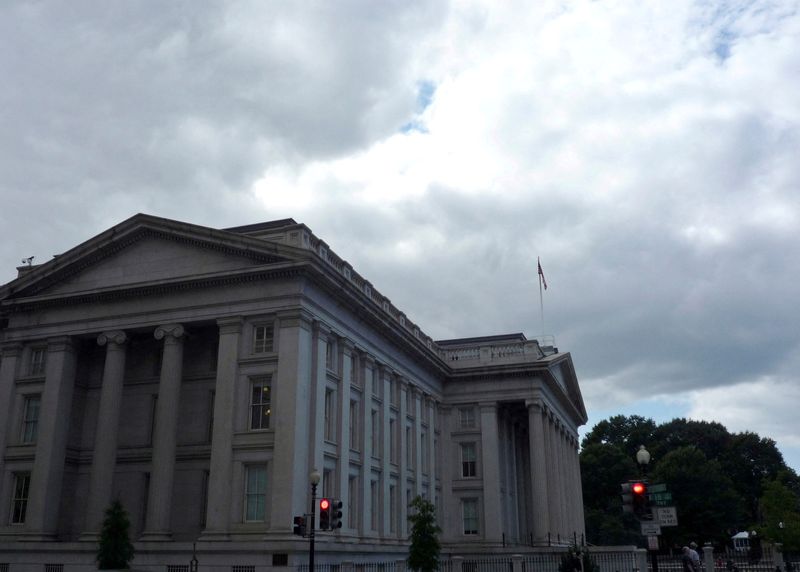By Karin Strohecker and Sujata Rao
LONDON (Reuters) - Russia edged closer to a historic debt default on Wednesday after the United States decided against extending a key license that had allowed Moscow to keep paying bondholders despite the sanctions imposed on it for attacking Ukraine.
The license expired at 12:01 am ET (0401 GMT) on Wednesday, setting Russia on course for its first major default on sovereign international bonds in over a century.
Here are some questions and answers on what might happen next:
WHAT HAS CHANGED?
A license issued on March 2 by the U.S. Office of Foreign Assets Control (OFAC) had allowed for transactions between U.S. entities and Russia's finance ministry, central bank or national wealth fund in relation to debt payments.
That allowed Russia to keep up interest and maturity payments on its sovereign debt, despite wide-ranging curbs on dealing with Russian entities. Since Feb. 22, it managed to make payments on seven dollar-denominated bonds.
But the Treasury Department said late on Tuesday it would not extend the license. While its action directly affects only U.S. bondholders, holders elsewhere will find it challenging to accept Russian payments because of U.S. dominance of the global financial system.
SO HOW MUCH DEBT IS AFFECTED?
Russia has around $40 billion of international bonds outstanding, with just under $2 billion in external debt servicing left until year-end.
The debt can be divided broadly into three tiers: first, legacy bonds which are settled offshore in the usual manner and second, those issued after Moscow's 2014 annexation of Crimea which are settled at Russia's own national settlement depositary (NSD) and have alternative hard-currency payment provisions.
The last category comprises debt sold after 2018 which also settles at the NSD but contains provisions for payment in roubles.
WHEN WILL DEFAULT HAPPEN?
On May 27, interest payments worth $71.25 million and 26.5 million euros ($28 million) are due on two bonds. To beat the OFAC deadline, Russia kicked the payment process off last week.
Russia's NSD - the payment agent on the two bonds - said it has received the funds, and announced it will make the payments in foreign currency on May 27.
The prospectus for both bonds states that "payments in respect of the principal of and interest (including any additional amounts) on a Global Bond registered in the name of NSD will be payable to NSD in its capacity as the registered holder."
Some analysts, as well as Russia's finance ministry, see this as the payment having been fulfilled.
However, it is unclear whether the money will make it further into bondholders' accounts. By many definitions, funds' failure to appear in creditors' accounts does constitute a default.
Creditors said on Wednesday the cash due on the 27th is yet to arrive in their bank accounts. However, Russia also has a 30-day grace period after May 27 to make the payment.
WHAT ARE THE NEXT PAYMENTS?
If creditors do receive the May 27 payments, Russia faces payments on two bonds on June 23, and another one on June 24.
The June 23 payments are - much like the May 27 ones - due on bonds that are settled at the NSD.
However, the latter is $159 million due on a bond issued in 1998. Because this issue can only be settled offshore, analysts reckon Russia will not be able to make this payment without the Treasury license.
This bond carries a grace period of 15 business days.
WILL CREDIT DEFAULT SWAPS BE TRIGGERED?
The question is whether a potential non-payment will trigger a payout on credit default swaps (CDS) which investors use to insure their exposure to specific risks, in this case Russia defaulting on its sovereign debt.
A committee of major banks and asset managers is tasked with deciding whether a "credit event" has occurred. That in turn can trigger a payout.
JPMorgan (NYSE:JPM) expects that bonds that can be settled within Russia and receive payment at the NSD will not lead to a payout for CDS holders.
"Even if this payment is not subsequently transferred to the bondholders, this may be enough to avoid a CDS trigger," JPMorgan analysts said in a note to clients.
However, if Russia fails to make the payment due June 24, CDS could be triggered once the grace period expires.
There are currently $2.54 billion of net notional CDS outstanding in relation to Russia, including $1.68 billion on the country itself and the remainder on the CDX.EM index, JPMorgan calculated.
